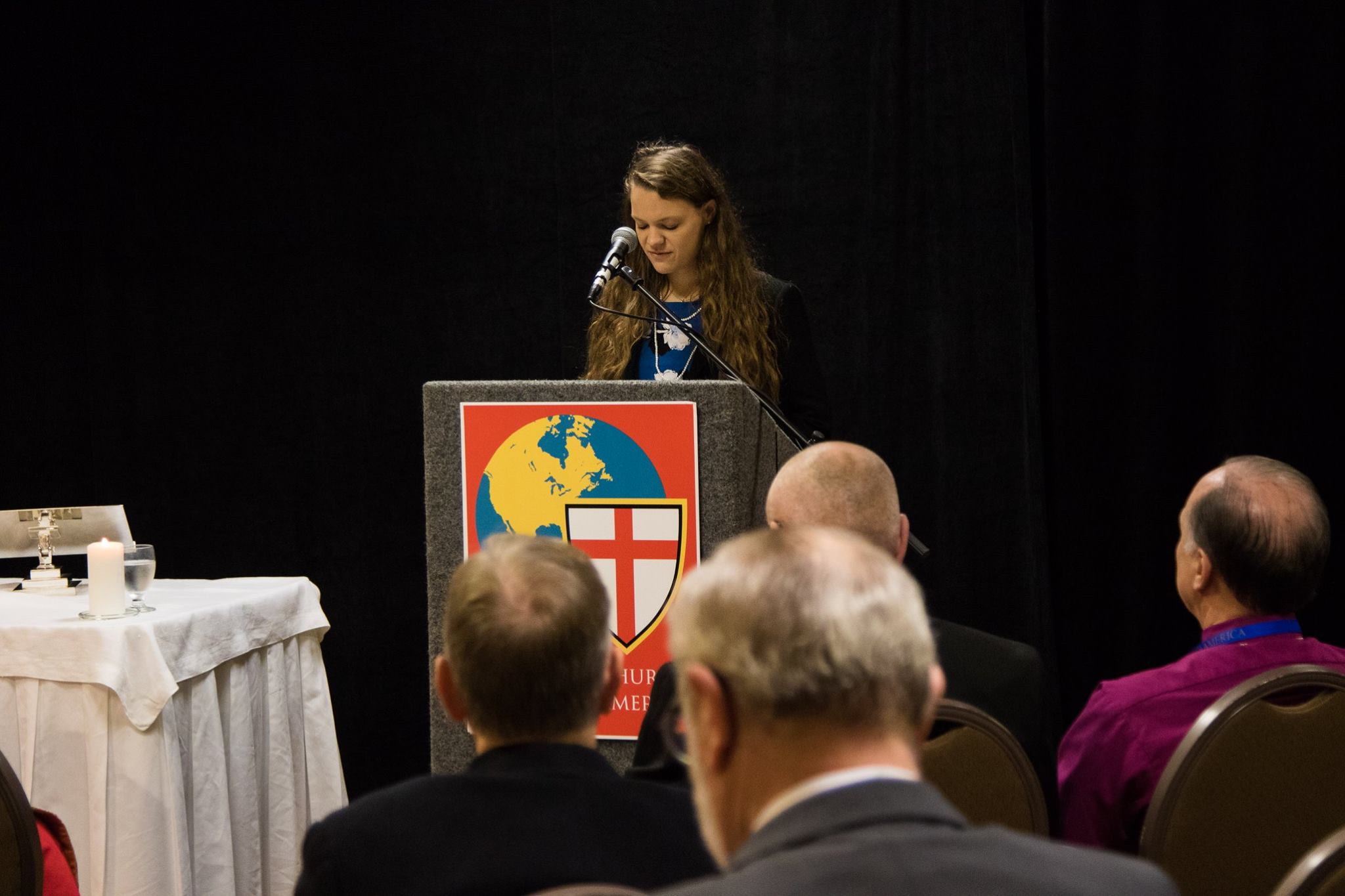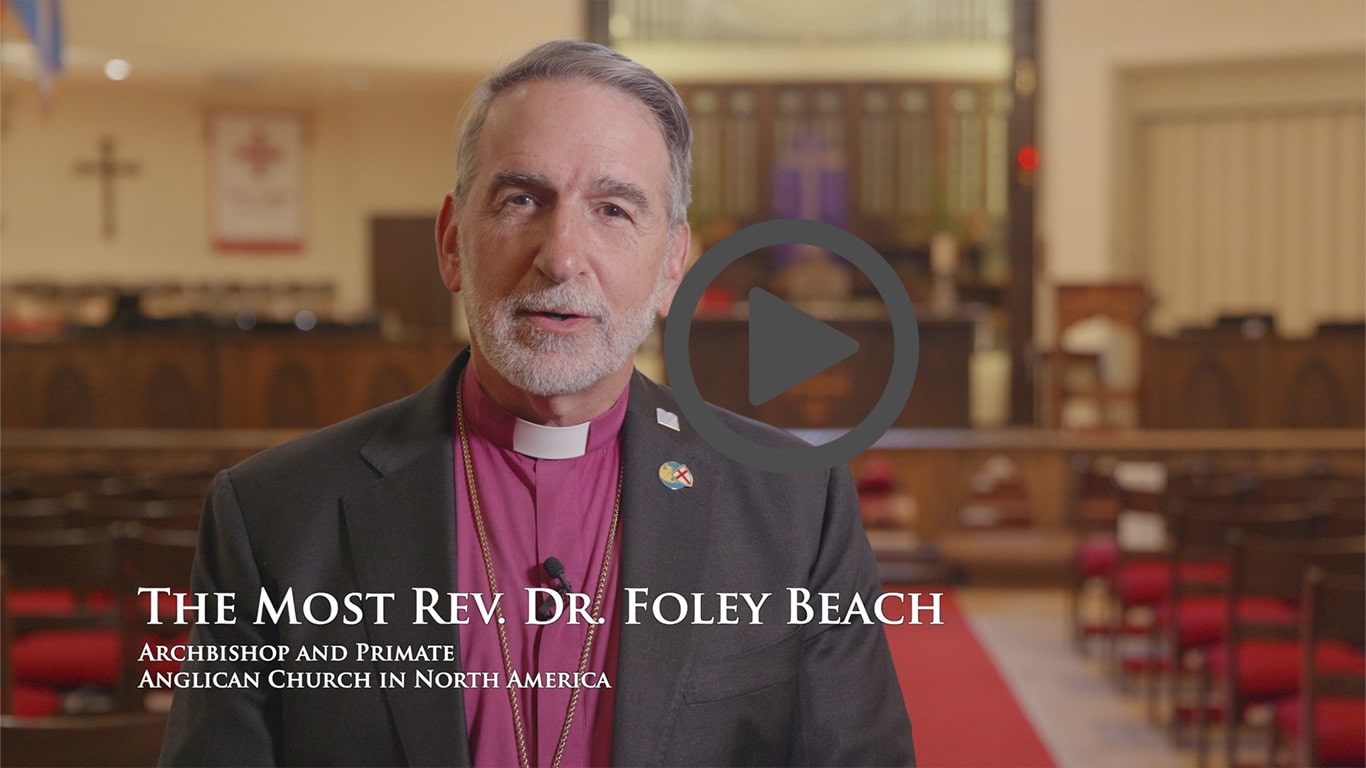The winners of the 2021 Archbishop’s Annual Summer Essay Contest were announced today by Anglican House Publishers, the sponsoring organization for the contest. For this year, the Most Reverend Dr. Foley Beach, Archbishop and Primate of the Anglican Church in North America, invited entrants to submit an essay that provides a Biblical and Theological perspective on pandemics.
Archbishop Beach commented on the essays which were submitted:
The depth of theological understanding, the recalling of the Church’s history, and the creativity with these papers are amazing. Not only did I learn much, but I was personally challenged to look to Christ Jesus in the midst of the current challenges we face with the pandemic.
The following is the winning essay from the Rev. Toby Larson of Spotsylvania, Virginia:
“Has God Changed? Biblical And Theological Perspectives on Pandemics”
Today’s global pandemic has separated the living from the dead and the living from the living.
Do you know what God thinks about pandemics? If you have never thought about it, that’s OK because you probably have never needed to—until now. The Chinese people have a saying: you learn a fence needs mending after the sheep have run away.
Until recently, most of our anguish has been personal and intensely private: a job loss, a social rejection, the humiliation of missing mortgage payments, hearing a doctor say “cancer,” repairing a broken heart after infidelity.
Today, however, we share public anguish. Because even if this pandemic has spared you from losing a loved one or livelihood, who can grasp the unimaginable loss of so much innocent life — men, women, and children, human beings made in God’s image? We want to cry as we know we should. We want to join Jeremiah’s plea: “Oh, that my head were a spring of water and my eyes a fountain of tears! I would weep day and night for the slain of my people” (Jer. 9:1).
Does Scripture say anything about pandemics? I’m pleased to say it does and that God uses them for his purposes. The Bible, however, rarely speaks of pandemics as we define them today (i.e., a scourge of one disease that sweeps the planet). Instead, it records large-scale plagues, pestilence, and disease. These calamities afflicted Israel, along with the nations and empires that swirled in her orbit, leaving thousands upon thousands devastated or dead. These scourges were the “pandemics” of their day, and Scripture says God sent them (e.g., Lev. 26:25; Ezek. 14:19-21).
Does God do the same today? Does he still send mass scourges upon nations? It’s a fair question because the writer of Hebrews says, “Jesus Christ is the same yesterday and today and forever” (Heb. 13:8). So, if God never changes, does that mean he still uses pandemics as he did before?
We have many examples of where God seems to be different. For instance, in Moses’ day, God ordered a man caught cutting firewood on the sabbath to be put to death (Num. 15). Around that same time, the son of an Egyptian man and an Israelite mother left his tent and fought with a full Israelite. Newscasts today might call it a racially motivated crime. It was, however, presumably not unlawful to strike a man who was not one’s father (cf. Ex. 21:15). Here, the actual crime is the blasphemy uttered by the man of mixed parentage in the presence of many witnesses. And for that offense, God orders him to be put to death (Lev. 24). Honestly, do these Old Testament examples sound like the Jesus you know who came to save the world and not condemn it (John 3:17)? And yet, Scripture declares God ended thousands of lives by his various decrees, from Noah’s flood onward.
This essay will explore God’s purpose in sending pandemics throughout Bible times and conclude that while God has not changed, something about our times has.
Two Origins
A disease may arise solely because of the Fall. Alternatively, Scripture says that God can instigate a sickness as a response to sin. Jesus said that a condition might have nothing to do with sin (John 9:3)—but it may (John 5:14). By extension, we can say the same for disease on a large scale. And so, a pandemic may represent God’s response to sin, or it may not.
Science, Medicine, and Faith
The animating and plausible assumption of culture is that science alone can explain the genesis of a pandemic and its cure. After all, most of God’s judgments described in Scripture do not look supernatural. Meteorologists can explain the origin of drought and wildfires. Geologists, economists, psychiatrists, politicians, and medical doctors can explain why we experience earthquakes, inflation, war, paralyzing dread, tumors, and pandemics.
The Bible, however, shows that if God chooses, he can intrude upon nature. That Jesus could calm a storm implies he could also generate one. In Scripture, catastrophic events sent by God rarely came “directly” from him (e.g., fire falling from the sky, 2 Ki. 1:10). Instead, he used secondary agents and causes (he could have made water cascade from a cloudless sky, but he used rain clouds (1 Ki. 18:44f.). In the Hebrew Scriptures, the typical secondary agents God used were the three common banes of the ancient world: the sword (i.e., war or exile), famine, and plague/pandemic (Jer. 14:11-12). Jeremiah, approximately six hundred years before Christ, cites this three-fold list seven times.
Understanding God’s Judgments
Scripture speaks of two types of judgments: eternal and temporal. These differ in their object, purpose, method, and severity.
(a) Eternal/Final Judgment. No church or nation will stand at the final judgment. The sole object is the individual upon whom God will adjudicate every thought and careless word, faith in Jesus or lack thereof, every deed that was done or left undone, and the motives of the heart. God’s purpose in eternal judgment is retributive (reconciling the infinite demerit of sin with an infinite God). The method is physical and spiritual separation from God. The severity is extreme.
(b) Temporal Judgment. Compared to eternal judgment, the severity is mild. The objects of temporal judgment are individuals, churches, and nations who receive God’s approbation or disapprobation in the midcourse of history. God’s purpose is remedial for those whose lives he spares, to reform and restore, to deter God’s people from future failure, and to vindicate and bring comfort to his people. His methods, as recorded in the past, included pandemics.
As described in the New Testament, God uses temporal judgments to lessen and deter further sin. Two examples: 1. Paul tells the Corinthian church of seven events recorded in Exodus in which the Lord punished Israel, leaving many Israelites dead. Paul says that God’s intention, in part, was to warn us on whom the fulfillment of the ages has come (1 Cor. 10:11). 2. Christ threatens to cast “Jezebel” on a bed of suffering for her spiritual adultery. Jesus promises the same for all those among the church of Thyatira who support her. “Then all the churches,” Christ says, “will know that I am he who searches hearts and minds, and I will repay each of you according to your deeds” (Rev. 2:23).
Pandemics in the Biblical World
(a) God scourged Egypt with widespread plagues upon its people, livestock, and land (Ex. 9-10). Later, God said that other nations who hated Israel could expect the same (Deut. 7:15). And, if Israelites were not careful to obey all the LORD commanded, they would not be exempt from God-sent diseases, drought, and plague (e.g., Deut. 28:15ff.). Moses even composed a song about how God’s “works are perfect, and all his ways just… who sends wasting famine, consuming pestilence, and deadly plagues” (Deut. 32).
(b) In response to three men stirring up discord in the camp, the LORD followed through on his promises. In quick succession, God sent an earthquake that sent the main instigator (Korah) and all those associated with him into the realm of the dead, a fire came out from the LORD and burned up 250 men, and a pandemic struck 14,700 Israelites dead (Num. 16-17).
(c) Sometime later, as Israel camped on the plains of Moab, Moabite women seduced Israelite men who worshipped the Moabite deity and sacrificed their sexual purity. Soon God’s wayward people suffered a plague that left 24,000 of them dead (Num. 25:7-8).
(d) Centuries later, when King David failed to represent God’s holiness, God again disciplined his people with a fast-moving pandemic that raged from “Dan to Beersheba,” leaving 70,000 people dead (1 Chron. 21).
(e) Later in Israel’s history, the LORD said through Jeremiah the prophet, “They (my people) turned their backs to me and not their faces; though I taught them again and again, they would not listen or respond to discipline.” Jeremiah warned the unrepentant nation that God would respond with “sword, famine, and plague” (Jer. 32).
(f) Even as temporal judgments piled up, the prophet Ezra believed God was too lenient with the people. Ezra declared, “What has happened to us results from our evil deeds and our great guilt, and yet, our God, you have punished us less than our sins deserved” (Ezra 9:13).
God’s Visual Aids
In the ancient world, God used various ways to get his message into the learning center. Prophets employed teaching and memory aids, devices such as poetry, song, and physical enactments. Some examples:
- To warn Jerusalem of its impending judgment, Jeremiah smashed a clay pot showing what would happen to Judah if she did not repent (Jer. 19).
- Ezekiel made a model of Jerusalem, a siege-works against it, and performed various enactments to show what Babylon was about to do.
- In the New Testament, John the Baptist used the visual aid of water to show how people needed spiritual cleansing.
Pandemics were among God’s most graphic Old Testament visual aids to show what he thinks of sin. Large groups of humanity dying depicted God’s view of sin and his final judgment. Pandemics foreshadowed the time when God will cast away all peoples who do not belong to him. Scripture calls this “the second death” (Rev. 2:11).
However, God’s most tremendous visual aid to show the seriousness of sin would come with Jesus’ death.
The Efficacy of Temporal Judgments
Pandemics, and other forms of God’s discipline that climaxed in Israel’s exile, cured Israel’s propensity to bow down to other gods. After years of exile in Babylon, Israel never again struggled with idolatry. She had, however, other sins like pride and lack of integrity that did not go away.
Ultimately, why did God do what he did to his children? His discipline was to achieve “singleness of heart and action, so that they will always fear me and that all will then go well for them and their children after them. I will make an everlasting covenant with them: I will never stop doing good to them, and I will inspire them to fear me so that they will never turn away from me” (Jer. 32:38-40).
End-Time Pandemics
Biblical history describes God as having sent vast, yet geographically localized, “pandemics.” But Scripture promises end-time global pandemics yet future, the likes of which the world will not have experienced until that day. The book of Revelation warns of two horsemen named “Death” and “Hades” who will carry famine, pestilence, and diseases (all kinds of death) to “a fourth of the earth.” These horsemen will make war upon ungodly nations for altering God’s moral laws and blaspheming the One who “has control over the plagues” (Rev. chapters 6 and 16).
Scholars debate if we should take descriptions of these end-time pandemics at face value. Some say that the harm, fire, water becoming blood, and pestilence are literal. Others believe these pandemics spiritual in that they deprive the ungodly of all earthly security, affecting the minds of all those who will not listen to the church’s witness (Rev. 9:5-6). Whether these global pandemics are literal or spiritual, nevertheless, they will make people so reprobate as to celebrate the death of God’s saints whose testimony “torments” them (11:10).
Regardless of how one understands the devastation wrought upon humanity by end-time temporal judgments, Scripture makes clear these events will cause “times of distress such has not happened from the beginning of nations until then” (Dan. 12:1). In their distress, people will exhibit one of two reactions: worldly fear will push many away from God, but godly fear will drive others deeper into the arms of Jesus.
Has God Changed?
In some ways, God seems to have changed. Sins that earlier would have brought swift temporal judgment no longer seem to elicit heaven’s exact response. For instance, in the Old Covenant, God ordered blasphemers to be stoned. In the New Covenant, Paul, though “a blasphemer, persecutor, and violent man” became an apostle (1 Tim. 1).
So, how can we account for God’s new apparent leniency? We can know the answer by understanding our unique times. God’s Old Testament moral precepts are still perfectly valid, holy, and just (Rom. 1:20). His opinion of sin and his promised response to evil has not changed. However, what has changed is the more significant period of grace he now extends to sinners, churches, and nations.
For people today, living through a pandemic, we are familiar with goods not yet shipped. God’s judgment is like that. For those who do not repent, heaven’s response is likely on backorder. Theologians call this time of God’s mercy—the age of grace. Because of what Jesus has done, God is giving people the maximum time to get right with him, not wanting anyone to perish, but everyone to come to repentance (Rom. 2:4, 2 Pet 3:9).
Summary
The LORD works through the regular cycles of life, but he has not limited himself to them. The maker of all we see and cannot see is free to use nature or disrupt it to accomplish his purposes because nowhere in Scripture has God excused himself from sending the temporal judgment of pandemics upon peoples, nations, and churches.
Even so, we know Jesus’ thoughts about all suffering. The Son of Man never met a sickness or disease he liked because “in their distress, he too was distressed” (Isa. 63:9). Nevertheless, embracing all that Scripture teaches, we must “pay the most careful attention to what we have heard so that we do not drift away” (Heb. 2:1).
How shall a pandemic-stricken church not drift? A young pioneer missionary named Hudson Taylor, on his first voyage to China in 1853, faced a severe storm off the coast of Wales. When the captain ordered passengers to put on lifebelts, Taylor, not wanting to show unbelief and dishonor God, gave his lifebelt away even though he had promised his mother he would wear one. Four and a half months later, the ship arrived safely, and Taylor founded the China Inland Mission, which, under his dynamic leadership, grew to 825 missionaries and over 500 national workers by the end of his life. Taylor, whose primary principle was dependence on God alone, came to see his mistake on that first voyage. He wrote, “The use of means ought not to lessen our faith in God, and our faith in God ought not to hinder our using whatever means he has given for the accomplishment of his purposes.”
So, while today’s pandemic has cast much of the world adrift, God will not let his people swerve. Because he is the same yesterday and today and forever — in this age of grace — he will not deny his church the means to stay on his course.
And while we do not have the Bible’s authoritative word about today’s pandemic to know if it is nature unleashed, bio-engineered, or a God-sent judgment, we know a God who knows, and he will never separate himself from us.
The Rev. Toby Larson is an ACNA priest in Virginia. After coaching newscasters in China, he earned an M. Div. and Th.M. from Gordon-Conwell Theological Seminary and planted two churches. He now directs Celebration International, a Great Commission ministry providing creative ways to reach the lost and raise the found.
All winning essays are available on the Anglican House Publishers website at www.anglicanhousepublishers.org.






